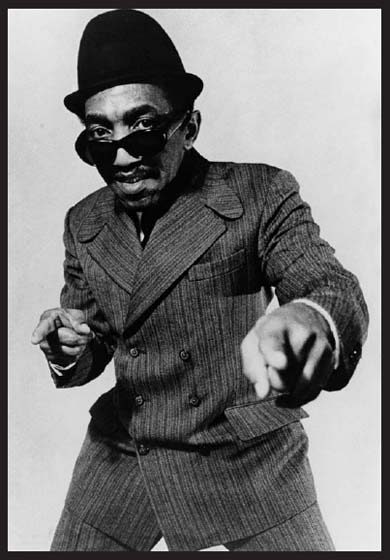The Encyclopedia of Dead Rock Stars (283 page)
Read The Encyclopedia of Dead Rock Stars Online
Authors: Jeremy Simmonds

Whether known as the ‘godfather of ska’ or just ‘Boss Skinhead’, the popularity of singer Laurel Aitken seemed to transcend the genre and cross generations. Having begun his singing career in the forties, Aitken bagged an eleven-week chart-topper in Jamaica with ‘Little Sheila/Boogie in My Shoes’ (1958), widely regarded as the first ska hit - and certainly the first release on Island Records. His output in the West Indies continued to sell, though Aitken was to receive little commercial reward elsewhere in the world; despite this, he became a popular cult figure in Britain, having moved there in 1960. Adopted by the skinheads in the late part of that decade, Aitken was once more in favour during the ska revival at the turn of the eighties, touring with bands such as The Beat, while harder-core punks The Ruts also played as his backing band.
Laurel Aitken performed late into his life, continuing even after diagnosis with throat cancer some time ahead of his death from a heart attack early on the morning of 17 July 2005.

Laurel Aitken: The ‘Godfather’ dressed for business
Thursday 21
Patrick Sherry
(Bradford,1976)
Bad Beat Revue

‘I accept his death was a tragic accident doing something he loved.’
Charlotte Sherry, Patrick’s widow
Up-and-coming Yorkshire rockers Bad Beat Revue – whose 2003 debut album
Still Cheating
had impressed many – only stepped in to play a Club
NME
night at The Warehouse, Leeds, on 20 July after the anticipated band had pulled out hours before. His group having something of a reputation for rip-roaring shows, singer Patrick Sherry – who formed BBR with his guitarist brother Brendan – was known for his onstage high-jinks; unfortunately, on this night, his grande finale was to end in disaster. Attempting to reach a mid-air lighting rig, Sherry threw himself into the air but failed to make full connection with the gantry, arcing into a somersault instead, due to the force of his momentum, and landing on his head before his shocked audience. Sherry was rushed to Leeds General Infirmary but died the following morning from severe head and neck injuries. A shopfitter by day, the charismatic frontman and his wife of two years had been expecting a child. (The event mirrored somewhat the blunt-trauma death of German metal singer Gunther Dietz, whose Hamburg audience moved to one side as he took his final stage dive in August 1997.)
Long John Baldry
(Haddon, Derbyshire, 12 January 1941)
Bluesology
Steampacket/The Hoochie Coochie Men/
Cyril Davies Allstars Blues Incorporated

On the same day, British blues lost a singer revered as one of its genuine ‘giants’, in both senses of the word, a vast number of top names – including Eric Clapton and Elton John – having honoured the man as an inspiration to their own careers. It’s easy to see how Long John Baldry – at six foot seven – came by his nickname, but this formidable performer was also blessed with a rich baritone to augment his image. Alexis Korner was one of the first to take a shine to Baldry, inviting him to join his Blues Incorporated line-up in 1961 after hearing the young man exercising his lungs with the combos of Cyril Davies and Ramblin’ Jack Elliott. Blues Incorporated became a legendary name, nurturing the talents of, among others, Jack Bruce and various future Rolling Stones. Returning to Davies’s group, Baldry took over after the sudden death of its leader in 1964, refashioning the band as The Hoochie Coochie Men, who thereafter became Steampacket. This remarkable blues conglomerate boasted both Baldry and an edgy young man called Rod Stewart providing the male vocals, while Julie Driscoll supplied the female voice. (Jimmy Page had been a guitarist with the unit as well.) Baldry’s shoulder-rubbing with the great and good didn’t end there: after the demise of Steampacket, he formed Bluesology with Reg Dwight, aka Elton John. (Dwight created his own moniker from those of sax-player Elton Dean and Baldry himself – while the latter is credited as the person who talked him out of committing suicide, as documented in John’s 1975 song ‘Someone Saved My Life Tonight’
( Death Toll #3).)
Death Toll #3).)

Long John Baldry adopts the pose most others reserved for him
Baldry enjoyed his greatest success as a solo artist with the Pye label, taking the swoonsome ballad ‘Let the Heartaches Begin’ all the way to UK number one at the end of 1967. Further singles were also hits as the singer became an unlikely pin-up towards the end of the decade. Baldry’s career was halted by mental-health problems, causing him to be institutionalized in the early seventies. Though he made a spirited comeback – the album
Baldry’s Out!
(1979) showed a considerable sense of humour – he was not to enjoy the same level of acceptance again. (A fluke Australian hit with ‘You’ve Lost that Lovin’ Feeling’ – performed with US singer Kathi MacDonald – did, however, come his way later that year.)
For the last twenty-five years of his life, John Baldry took citizenship in Canada, where he settled into a lucrative second career as a voice-over artist, for which he gained a Grammy nomination in 1998 for his work with Disney. Failing to shake off a severe chest infection contracted early in 2005, Baldry was admitted to Vancouver General Hospital – but doctors were unable to save him.
See also
Alexis Korner ( January 1984). Blues Incorporated saxophonist Dick Heckstall-Smith died just months before Baldry (2004).
January 1984). Blues Incorporated saxophonist Dick Heckstall-Smith died just months before Baldry (2004).
Friday 22
Eugene Record
(Chicago, Illinois, 23 December 1940)
The Chi-Lites

Originally confusing everyone as one of two vocal troupes called The Hi-Lites, Marshall & The Chi-Lites
– renamed in 1960 after lead singer Marshall Thompson – flitted from label to label until a new leader brought a change in their fortunes. Thompson’s school-friend Eugene Record had steadily been making a name for himself as a songwriter of no small merit, and by the end of the decade, his contributions saw The Chi-Lites – Record (lead), Thompson (baritone), Robert ‘Squirrel’ Lester (tenor) and Creadel ‘Red’ Jones (who died in 1994 – bass) – transformed into their best-known guise as smooth soul operators. Early hits, such as ‘(For God’s Sake) Give More Power to the People’ (1971), contained something of a political message, but it’s with ballads like ‘Have You Seen Her?’ (1971, reissued in the UK, 1975), ‘Oh Girl’ (1972, a US number one), ‘Homely Girl’ (1974) and the much-underrated ‘It’s Time for Love’ (1975) that The Chi-Lites are most readily associated. Record’s work for others on the Brunswick label – including his first wife Barbara Acklin, who died seven years before him
( November 1998)
November 1998)
– caused him to move away from the group in 1976 to concentrate on solo recordings.